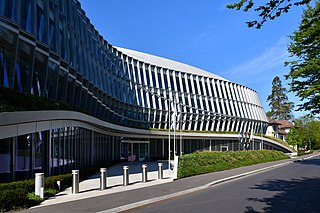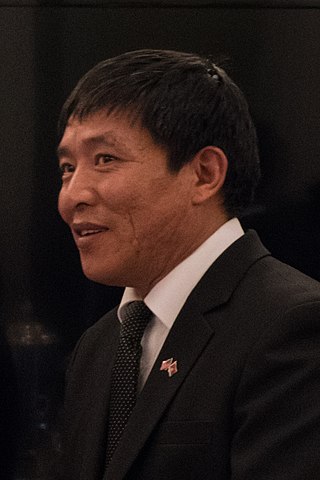Related Research Articles

The International Olympic Committee is the international, non-governmental, sports governing body of the modern Olympic Games. Founded in 1894 by Pierre de Coubertin and Demetrios Vikelas, it is based in Lausanne, Switzerland. The IOC is the authority responsible for organizing the Summer, Winter, and Youth Olympics. The IOC also is the governing body of the National Olympic Committees (NOCs) and of the worldwide Olympic Movement, the IOC's term for all entities and individuals involved in the Olympic Games. As of 2020, 206 NOCs officially were recognized by the IOC. The IOC president has been Thomas Bach since 2013.

The Tibet Autonomous Region, officially the Xizang Autonomous Region, often shortened to Tibet or Xizang, is an autonomous region of China and is part of Southwestern China.

The 2008 Summer Olympics, officially the Games of the XXIX Olympiad and officially branded as Beijing 2008, were an international multisport event held from 8 to 24 August 2008, in Beijing, China. A total of 10,942 athletes from 204 National Olympic Committees (NOCs) competed in 28 sports and 302 events, one event more than those scheduled for the 2004 Summer Olympics. This was the first time China had hosted the Olympic Games, and the third time the Summer Olympic Games had been held in East Asia, following the 1964 Olympics in Tokyo, Japan, and the 1988 Olympics in Seoul, South Korea. These were also the second Summer Olympic Games to be held in a communist state, the first being the 1980 Summer Olympics in the Soviet Union.

The Panchen Lama is a tulku of the Gelug school of Tibetan Buddhism. The Panchen Lama is one of the most important figures in the Gelug tradition, with its spiritual authority second only to the Dalai Lama. Along with the council of high lamas, he is in charge of seeking out the next Dalai Lama. Panchen is a portmanteau of Pandita and Chenpo, meaning "great scholar".

The Tibetan independence movement is the political movement advocating for the reversal of the 1950 annexation of Tibet by the People's Republic of China, and the separation and independence of Greater Tibet from China.
Free Tibet (FT) is a non-profit, non-governmental organisation, founded in 1987 and based in London, England. According to their mission statement, Free Tibet advocates for "a free Tibet in which Tibetans are able to determine their own future and the human rights of all are respected."

Ten cities submitted bids to host the 2008 Summer Olympics and Paralympics that were recognized by the International Olympic Committee (IOC), five of which made the IOC Executive Committee's shortlist. The games were awarded to Beijing, China on July 13, 2001. The other shortlisted cities were Toronto, Paris, Istanbul and Osaka. Beijing won an absolute majority of votes after two rounds of voting, eliminating the need for subsequent rounds of voting. IOC delegates and the media identified a number of factors in its favor, including the size of the country, improvements in Chinese anti-doping enforcement, and its close loss to Sydney, Australia eight years earlier. In that bidding process, which chose the host city for the 2000 Summer Olympics, Beijing led every round of voting but lost in the final round to Sydney by two votes.

Russia, referred to by its formal name; the Russian Federation, by the International Olympic Committee, has competed at the modern Olympic Games on many occasions, but as different nations in its history. As the Russian Empire, the nation first competed at the 1900 Games, and returned again in 1908 and 1912. After the Russian revolution in 1917, and the subsequent establishment of the Soviet Union in 1922, it would be thirty years until Russian athletes once again competed at the Olympics, as the Soviet Union at the 1952 Summer Olympics. After the dissolution of the Soviet Union in 1991, Russia competed as part of the Unified Team in 1992, and finally returned once again as Russia at the 1994 Winter Olympics.
Terrorism in China refers to the use of terrorism to cause a political or ideological change in the People's Republic of China. The definition of terrorism differs among scholars, between international and national bodies and across time and there is no legally binding definition internationally. In the cultural setting of China, the term is relatively new and ambiguous.

The 2008 Summer Olympics torch relay was run from March 24 until August 8, 2008, prior to the 2008 Summer Olympics, with the theme of "one world, one dream". Plans for the relay were announced on April 26, 2007, in Beijing, China. The relay, also called by the organizers as the "Journey of Harmony", lasted 129 days and carried the torch 137,000 km (85,000 mi) – the longest distance of any Olympic torch relay since the tradition was started ahead of the 1936 Summer Olympics.

The Tibetan Olympics 2008 was held from 15 to 25 May 2008 in Dharamsala, in northern India. Its purpose was to ensure that Tibetans could also celebrate the excitement of world's biggest sporting event – the 2008 Olympic Games in Beijing – following the approach of sports and communication.

The 2008 Tibetan unrest, also referred to as the 2008 Tibetan uprising in Tibetan media, was a series of protests and demonstrations over the Chinese government's treatment and persecution of Tibetans. Protests in Lhasa, the capital of Tibet, by monks and nuns on 10 March have been viewed as the start of the demonstrations. Numerous protests and demonstrations were held to commemorate the 49th anniversary of the 1959 Tibetan Uprising Day, when the 14th Dalai Lama escaped from Tibet. The protests and demonstrations spread spontaneously to a number of monasteries and throughout the Tibetan plateau, including into counties located outside the designated Tibet Autonomous Region.
A number of concerns and controversies surfaced before, during, and after the 2008 Summer Olympics, and which received major media coverage. Leading up to the Olympics, there were concerns about human rights in China, such that many high-profile individuals, such as politicians and celebrities, announced intentions to boycott the games to protest China's role in the Darfur conflict, and Myanmar, its stance towards Tibet, or other aspects of its human rights record. During the games in Beijing, the city was also under a high alert because of security concerns following civil unrest in Tibet and terrorist attacks by Xinjiang separatists. The levels of air pollution in Beijing also came under much scrutiny, due both to concerns about athletes' health and concerns that Beijing had failed to live up to promises it made during its Olympic bid. Foreign journalists at the games reportedly faced various restrictions to their work, limitations to internet access, and threats of physical violence. The gymnastics competition caused a major worldwide controversy during and after the games when some Chinese gymnasts were accused of being under the minimum age, but then cleared after an investigation. Other controversies surrounding the 2008 Summer Olympics included ticketing problems, displacement of Beijing residents due to construction and demolitions, and alleged persecution of individuals applying to protest.

The 14th Dalai Lama, Tenzin Gyatso is, as the incumbent Dalai Lama, the highest spiritual leader and head of Tibetan Buddhism. Before 1959, he served as both the resident spiritual and temporal leader of Tibet, and subsequently established and led the Tibetan government in exile represented by the Central Tibetan Administration in Dharamsala, India. By the adherents of Tibetan Buddhism, he is considered a living Bodhisattva, an emanation of Avalokiteśvara in Sanskrit, and Chenrezig in Tibetan. The Dalai Lama, whose name means "Ocean of Wisdom," is known to Tibetans as Gyalwa Rinpoche, "The Precious Jewel-like Buddha-Master," Kundun, "The Presence," and Yizhin Norbu, "The Wish-Fulfilling Gem." His devotees, as well as much of the Western world, often call him His Holiness the Dalai Lama, the style employed on his website. He is also the leader and a monk of the Gelug school, the newest school of Tibetan Buddhism, formally headed by the Ganden Tripa.
The 2008 Tibetan unrest was a series of protests and demonstrations met by excessive force, focused on the persecution of Tibetans, in the buildup to the 2008 Summer Olympics in Beijing. There was a mixture of outrage and understanding from leading figures abroad.

The International Tibet Network, established in 2000, is a global coalition of Tibet-related non-governmental organisations campaigning to end the China's occupation and human rights violations in Tibet, and restore rights to the Tibetan people. Its purpose is to maximise the effectiveness of the worldwide Tibetan Freedom Movement. The Network works to increase the capacity of individual member organisations, develops coordinated strategic campaigns, and encourages increased cooperation among organisations.

Protests and uprisings in Tibet against the government of the People's Republic of China have occurred since 1950, and include the 1959 uprising, the 2008 uprising, and the subsequent self-immolation protests.

Dhondup Wangchen is a Tibetan filmmaker imprisoned by the Chinese government in 2008 on charges related to his documentary Leaving Fear Behind. Made with senior Tibetan monk Jigme Gyatso, the documentary consists of interviews with ordinary Tibetan people discussing the 14th Dalai Lama, the Chinese government, the 2008 Beijing Olympics, and Han Chinese migrants to the region. After smuggling the tapes of the interviews out of Tibet, however, Dhondup Wangchen and Jigme Gyatso were detained during the 2008 Tibetan unrest.
The 2022 Winter Olympics took place between the 4 and 20 February 2022 and were hosted by in China in the capital city of Beijing. The country selected was the subject of various concerns and controversies about their cost, environmental impact, censorship, espionage, COVID-19, sportswashing, and human rights issues.
References
- ↑ "Team Tibet's here, but diplomatic row in offing". The Times of India . Aug 2, 2007. Retrieved Aug 12, 2024.
- ↑ "IOC rebuffs Tibetan request for own team at the 2008 Beijing Olympics". The New York Times . Nov 10, 2007. Retrieved Aug 12, 2024.